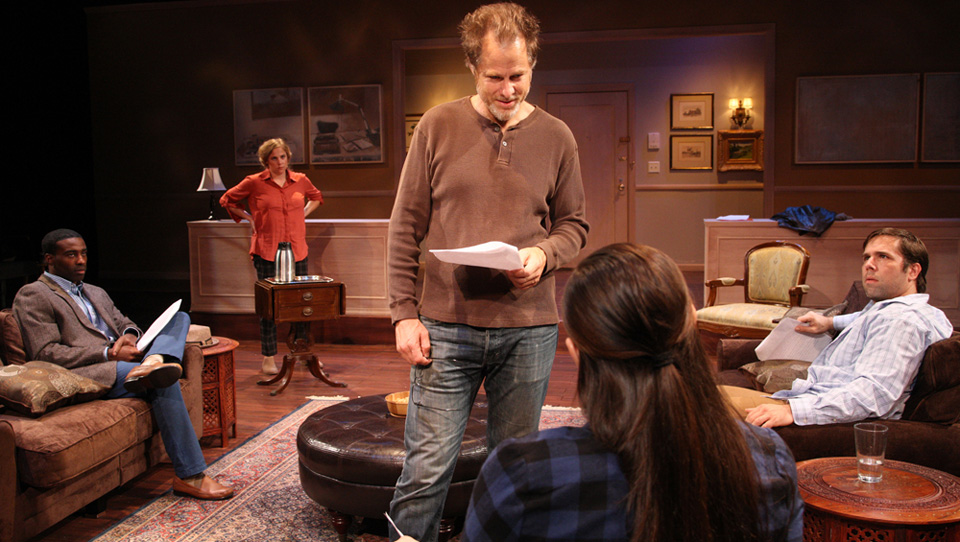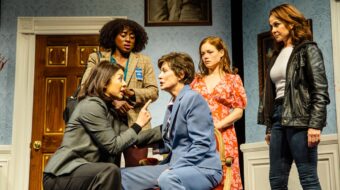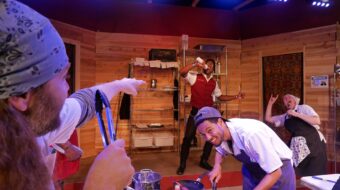
ANAHEIM, Calif. – We’ve all met people so brutally honest, so gratuitously insulting, so tone-deaf to human vulnerability, that we instinctively turn 180 degrees and walk – no, bolt – away from the toxicity. In the Orange County premiere of Theresa Rebeck’s 2011 play Seminar we meet just such a man, Leonard, who happens to be the supremely self-important teacher giving a private writing class for four aspiring novelists at nothing less than $5K for ten classes. Alan Rickman played him on Broadway. It went on to a limited engagement in Los Angeles with Jeff Goldblum (I missed it), and is currently scheduled for productions in Budapest, Edmonton, and Rochester later this year.
Rebeck has written a dozen or so plays, and for TV and film. I recall her Poor Behavior at the Mark Taper Forum in L.A. five years ago, and thinking this is a name to remember. In 2011, Newsweek named her one of the 150 Fearless Women in the World. She does appear unafraid to talk about tough issues and peel back some of the presumptions we so carefully maintain about ourselves.
Here Leonard is played with all his repulsive egotism by a masterful Ned Liebl. His four students include Kate (Karen Jean Olds), in whose elegant rent-controlled family apartment the class meets. She has been working on a story inspired by Jane Austen for six years and suffers Leonard’s coarse and coruscating criticism. Write “like a man,” he tells her with utter sexist dismissiveness. Then there’s Izzy (Asialani Holman), a young and beautiful Chinese-American whom the author sets up as Kate’s rival for male attention. Leonard praises her story because it has sex in it and sounds good, but his flattery is clearly aimed at her groin.
The two male students are Martin (Casey Long), the most reticent of them all to show his work, wary as he is of exposure to the disparaging taunts of his withering teacher; and Douglas (Christian Telesmar), an insufferably pretentious self-promoter who has talent (The New Yorker is looking at one of his stories) but in Leonard’s view will never become a great writer: Better he should give up his fiction dreams and move to Hollywood and get rich off screenplays. Douglas is played by an African-American actor, although the role does not deal with race or ethnicity as such – he was played by a Caucasian actor on Broadway.
The playwright raises a whirlwind of questions about the craft and the business of writing. Is Leonard in this only for the money and his own self-aggrandizement, or is he sincerely interested in nurturing new talent? And what dark shadows in his past could possibly have led him to be such a snarling animal toward his wards? “Writers in their natural state are about as civilized as feral dogs,” he proclaims, pointing to the vicious competitiveness in the field he knows so well.
Yet writers do not exist in a vacuum, either. All people who write need readers, and often it’s one reader at first, an editor, who can help shape their thinking, clarify their meaning, develop their voice and polish their style. Can that editor be trusted to be honest and constructive? Or is even your editor a potential adversary in the ever diminishing world of remunerated fiction? How supportive – and how critical – can you expect your fellow writers to be?
From whence does a writer derive their material? Is it only from their personal experience, or can they reinvent themselves to be anything they wish on the page? The middle-class white woman pens a “memoir” about a Cuban transvestite gangleader that reads so authentically that even Leonard is fooled. As Kate says, “Fraud is a fact of life in capitalist culture.” Ain’t that the truth.
Every few minutes in this 100-minute intermissionlees dramatic comedy, there’s a quick adjustment to make as we see who’s in favor, who’s in the doghouse, who cracks snarky jokes at others’ expense, who’s sleeping with whom (and why?), who’s leaving the group, and who begins seeing facets of other people they hadn’t noticed or appreciated before.
Here and there, in between the laughs, the put-downs and the absurd hilarity, it’s evident that people are more complex, more interesting, and in their own ways more wise than we first gave them credit for. I think this is the point – perhaps I’d go so far as to say the “message” – of the play. That despite the obvious faults and flaws in other people, some of them excruciatingly egregious, are there not also some redeeming values in them, some points of meaningful contact worth nurturing?
Perhaps we all need to listen a lot more before we rush to condemn.
Having said which, Seminar is not preachy at all. It’s wild, it’s funny, it’s knowing, and a thoroughly enjoyable ride.
Direction by Elina de Santos, making her Chance debut, is absolutely pitch-perfect. The audience formed a square U around the stage, but most of the seats were in the bottom of the U. When the actors spoke away from us toward the back of the stage, their voices grew indistinct. Unfortunately I found this especially true of the mostly soft-spoken Izzy character.
Costume and scenic designer Bruce Goodrich turned in fine work, the sets so suggestive of those tony Upper West Side apartments I have known. I don’t know whose idea it was, but the sound designer Jeff Polunas brought in the dulcet sounds of some classical piano études between scenes that made you think you were hearing a neighbor practicing in the next apartment. These brief respites also allowed the audience to calm down a bit after the previous scene’s fireworks and prepare for the next.
I was happy for this first exposure to one of the leading ensemble-driven theatre companies in Southern California. Founded in 1999, Chance Theater, “the official resident theater company of Anaheim,” has won five Ovation Awards and seems to enjoy enthusiastic community support.
Seminar plays through Oct. 23 on Fridays and Saturdays at 8 pm and Sundays at 3 pm at the Chance Theater at the Bette Aitken theater arts Center, 5522 E. La Palma Ave., Anaheim CA 92807. For further information and tickets call (888) 455.4212 or contact the box office.












Comments